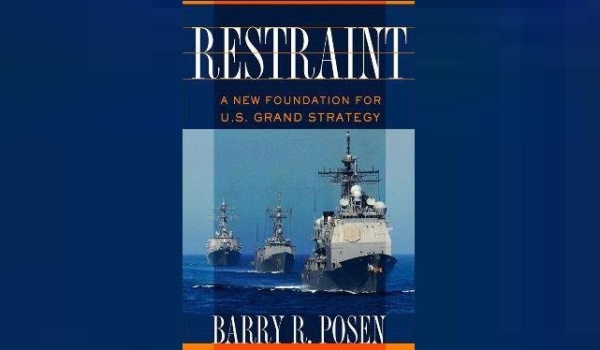Restraint: A New Foundation for U.S. Grand Strategy
14 مايو 2015

By Barry R. Posen
Reviewed by G. John Ikenberry
Posen has written the most challenging critique yet of the United States’ post–Cold War grand strategy of global engagement. According to Posen, U.S. liberals and neoconservatives both see a multitude of threats facing their country that call for elaborate American-led efforts at security cooperation and power projection. In their view, Washington must remain the world’s dominant military power, build alliances, deploy forces around the world, manage global institutions, and be ready to intervene anywhere to ensure stability and promote liberal democracy. But Posen advances a much narrower, classical realist definition of U.S. security interests: sovereignty, territorial integrity, and the safety of the homeland. The liberal hegemonic order is built around Washington’s ability and willingness to enforce global rules and protect allies, but Posen argues that this undertaking is too costly and unsustainable.
Yet how does one determine the proper price of “stability” or determine if the presence of U.S. forces in Asia and Europe prevents costly wars or provides Washington with political influence in other policy areas? Posen’s strong argument is that this dependence on U.S. power increases Washington’s propensity to make costly mistakes. But in the absence of a system that relies on Washington for stability, what would discipline American power and prevent the United States from pursuing self-destructive ideological crusades or risky overseas adventures? The trouble is that what Posen is proposing is really a strategy of disengagement, which comes with its own dangers. In reality, a more restrained United States would be one that is even more deeply bound to the international community through its leadership of global institutions and alliances.
——————————-
Source: Foreign Affairs Magazine
 عن أمل جنبلاط المتجدد: لبنان يستحق النضال
عن أمل جنبلاط المتجدد: لبنان يستحق النضال
 صحافيون أم عرّافون!
صحافيون أم عرّافون!
 ماذا يجري داخل أروقة بيت الكتائب المركزي؟
ماذا يجري داخل أروقة بيت الكتائب المركزي؟


 عن الخرائط التي تُرسم والإتفاقات التي تتساقط!
عن الخرائط التي تُرسم والإتفاقات التي تتساقط!
 “الإنحراف في الحياة”/ بقلم كمال جنبلاط
“الإنحراف في الحياة”/ بقلم كمال جنبلاط
 هاشتاغ #صار_الوقت يحل أولاً في حلقة جنبلاط
هاشتاغ #صار_الوقت يحل أولاً في حلقة جنبلاط
 طاولة نقاش عن أزمة الصحافة في جامعة AUST
طاولة نقاش عن أزمة الصحافة في جامعة AUST
 عبدالله: ليظهر لنا وزير مكافحة الفساد حرصه في صفقات البواخر والفيول
عبدالله: ليظهر لنا وزير مكافحة الفساد حرصه في صفقات البواخر والفيول
 عبدالله: غريب أمر وزارة مكافحة الفساد!
عبدالله: غريب أمر وزارة مكافحة الفساد!

 Comment to Uri Avnery: How Sad What Is Looming Ahead
Comment to Uri Avnery: How Sad What Is Looming Ahead
 “Not Enough!”
“Not Enough!”
 … لمن لم يقرأ يوسف البعيني/ بقلم وسام شيّا
… لمن لم يقرأ يوسف البعيني/ بقلم وسام شيّا
 كمال جنبلاط في مولده الأول بعد المائة: تعاليمه وأفكاره ما زالت الحلّ/بقلم عزيز المتني
كمال جنبلاط في مولده الأول بعد المائة: تعاليمه وأفكاره ما زالت الحلّ/بقلم عزيز المتني
 رئيس حزب/ وليس (… سابقاً)/ بقلم د. خليل احمد خليل
رئيس حزب/ وليس (… سابقاً)/ بقلم د. خليل احمد خليل
 التوازن السياسي في لبنان
التوازن السياسي في لبنان
 لبنان… مشاريع انقلابية مؤجلة
لبنان… مشاريع انقلابية مؤجلة
 جنبلاط وحَمَلة أختام الكاوتشوك
جنبلاط وحَمَلة أختام الكاوتشوك
 Le Liban est un symbole de tolérance
Le Liban est un symbole de tolérance
 Our Automated Future
Our Automated Future
 The True Origins of ISIS
The True Origins of ISIS
 Les Misérables vs. Macron
Les Misérables vs. Macron
 عذراً أيها المعلم/ بقلم مهج شعبان
عذراً أيها المعلم/ بقلم مهج شعبان
 رساله الى المعلم / بقلم ابو عاصم
رساله الى المعلم / بقلم ابو عاصم
 إلى روح القائد والمعلم كمال جنبلاط/ بقلم أنور الدبيسي
إلى روح القائد والمعلم كمال جنبلاط/ بقلم أنور الدبيسي
 أسرار وعناوين الصحف ليوم الجمعة 14 كانون الاول 2018
أسرار وعناوين الصحف ليوم الجمعة 14 كانون الاول 2018














